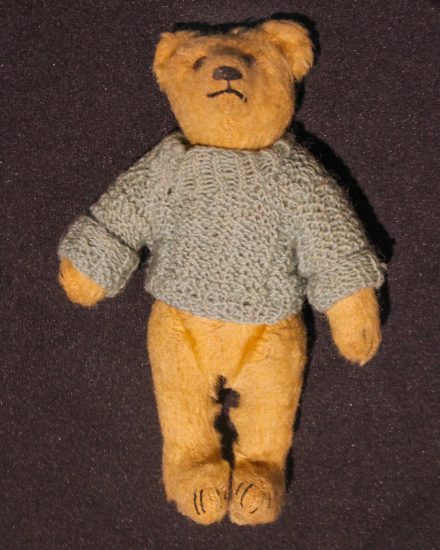By Sara Barber, Social Media Communications Coordinator

Eva was born in 1929 in Kamarno, Czechoslovakia. Eva recalls that sometime before the 1939 dismemberment of Czechoslovakia, her father read Mein Kampf and became certain that an impending conflict was coming. It was decided that the family needed to leave Europe to ensure their safety. They had planned to emigrate together, but this proved impossible with the desired destinations of Australia and New Zealand both having five year waits.
Soon after, Eva’s parents decided to put her on a Kindertransport to England when she was 10 years old, but her sister — seven and a half years behind her — was determined too young to join. Instead, the teddy bear kept Eva company along the way. She arrived in England in July 1939. She lived in a Montefiore home in Burgess Hill, a former mansion that housed fifty girls, aged 7 – 18 who were mostly from Germany.
After Eva had left for England, her parents and younger sister acquired three visas for Ecuador after another family canceled. Through 1942, 3,500 – 4,000 Jews found refuge in Ecuador. Julius Rosenstock, appointed by the Ecuadorian government, successfully petitioned for the entry of Jews who were living under Nazism. The vast majority settled in the capital city of Quito. Eva’s father’s younger brother had already traveled to Ecuador with his wife and child in 1939, just prior to Germany’s September 1, 1939 invasion of Poland. He eventually bought a bakery in Quito.
Eva left in 1940 to join her family in Ecuador, traveling by boat from Liverpool, England. On the journey, the boat stopped in Bermuda and Cuba. Eva noted that the ship could not stop in Miami because the United States was not accepting Jewish refugees. The ship went through the Panama Canal and Eva reunited with her family in Guayaquil, Ecuador.
Eva said the visas the family received were dependent on them working the land. The family went into the “jungle,” which they found lacked infrastructure. They rented a farm 10 miles from Quito and installed running water and plumbing to make it more livable. The family had to learn how to farm, and twice, her father had to be cured of malaria. Their family struggled the most their first year since they did not know the right time of year to plant their crops.
In Ecuador, Eva learned Spanish and attended the local school. She later attended a private school. During this time, a pro-Nazi school for ethnic Germans (Germans who lived outside the borders of Germany) was opened, but was later shut down. Eva was able to graduate high school in 1947.
The teddy bear was later donated to the Museum by Eva and her family in January of this year.